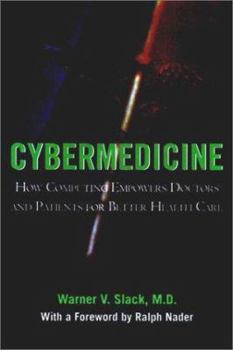Cybermedicine: How Computing Empowers Doctors and Patients for Better Health Care
A very compassionate, patient-first physician pressing for bolder and more comprehensive computer uses in clinical medicine and in direct patient interaction. ? From the Foreword by Ralph Nader The author presents a compelling argument for the use of computers for initial diagnosis and assessment, treatment decisions, and for self-care, research, prevention, and--above all--patient empowerment.
Format:Hardcover
Language:English
ISBN:0787903434
ISBN13:9780787903435
Release Date:May 1997
Publisher:Jossey-Bass
Length:214 Pages
Weight:0.47 lbs.
Dimensions:9.5" x 0.9" x 6.3"
Customer Reviews
4 ratings
Not a technical book, but a very good book anyway.
Published by Thriftbooks.com User , 19 years ago
If you are a medical informatics professional, you may enjoy reading this book. However, please note that this is not a technical book about medical informatics. This is a book about the why's of the use of computers in medicine and the why's of the failures in the implementation. The title say it all, it is a review about how computers should be used to empower the users (patients and health care workers). This book is for medical doctors, nurses, therapists, managers, and engineers working in a health organization. Sometimes the tone is too negative, but I think the goal is to make sure you don't fall in the same traps Mr. Slack has fallen in the past. Also, sometimes it feels too biased toward the doctor and patient, leaving everyone else as evil entities. (But that's my personal feeling, maybe it is not that biased or negative). Recommended for all health workers (so you get the idea if your IT department is doing its job), for managers (who can check ways to improve the IT services) and for IT workers (who can check if their objectives are not only aligned with the organization's goals, but also to check if you are giving a good service to the final users [the patients]).
Excellant Book that tells the true objective of computing
Published by Thriftbooks.com User , 26 years ago
the book is the depiction of one dedicated doctor's experience and efforts with clinical computing. excellant in every way and brings sence to the ojective of computing and a master piece
Good material; not constructive re: medical bureaucracy
Published by Thriftbooks.com User , 27 years ago
This is a book I looked forward to with much anticipation upon hearing about it. I am highly interested in the area of medical informatics, and the book gave an excellent summary of Dr. Slack's very interesting, personal experience with the introduction and advancement of computers into the field of medicine. The tone of the writing is not at all dry, and it was a very pleasurable read. I particularly enjoyed the way Dr. Slack emphasized the fact that if a system really WORKS, people will use it. Computer "literacy" and phobia are not issues if the system actually makes work easier. If a system is not adopted, then the user is not to blame, the designer is.My one criticism of the book is that towards the last third of the book, the author writes a lot about why computers have failed at some institutions. Though my gut feeling is that much of what he writes here is true (and from the clinician's point of view, it may appear this way), this last section of th! e book was entirely too negative, and had the tone of venting anger.The purpose of this book seems to be education, and this "demonization" of the admin definitely oversimplifies the situation, and does nothing for the reader. He reduces the problem into a lazy, self serving administrator standing in the way of the noble, idealistic clinician and engineer.It would have been better to examine the facts of this problem a little more closely in order to see how the "self-serving" attitude of administrators might be guided towards implementing good computer systems. As I said before, I share Dr. Slack's personal regard for many administrators, but this extended venting served no purpose.Though I have the single criticism of it, I still highly recommend the book. Dr. Slack has clearly been a pioneer in this area and has a unique perspective on computers and medicine, which he shares very well.
Excellent, good points about patient empowerment
Published by Thriftbooks.com User , 28 years ago
Generally a good book, explains a lot about the author's history. Good points about patient empowerment. Very important points about use of e-mail in clinical settings. I'm a little more cynical about the use of direct computer-patient dialog for clinical information (One such system once told me that I was suffering from premenstral tension...it forgot to ask my sex.) Would like to have much greater focus on the future, however...incidents from the 1960's and 1970's are not all that relevant today.






